Explore Your Garden Personality: The Traveler
http://decor-ideas.org 12/17/2013 19:40 Decor Ideas
A highly personal garden can be a beautiful thing. Through its bold strokes of color, subtle nuances, interplay of late-afternoon shadows, layers of texture and faint sounds and aromas, it tells a story of those who call it home. As in a well-written novel, some aspects of the story are immediately revealed to set the stage, while others await discovery in the coming chapters; others yet will remain secrets to all but a few.
Perhaps your space is anything but this. Let’s look at some ways to help you tell your story through the palette of your garden.

The first step to creating your personal garden is to do some introspection to determine what life story you would like your space to tell. Perhaps you have a traveler spirit and are drawn to adventure, mystery, intrigue, exotic distant locations and spontaneous day trips. Let’s see how you can translate these passions into the garden you have always wanted but didn’t know how to create.
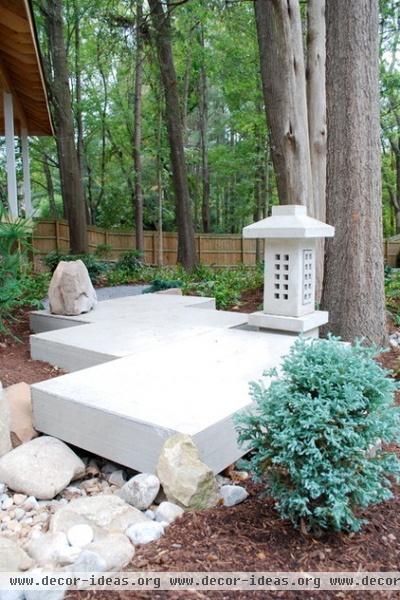
Create a garden entrance. Every good writer begins by setting the stage in chapter one. Your garden should do the same. A well-designed space always has a starting point. The entrance should set the garden apart from its surroundings, create a theme or mood, and evoke a sense of anticipation in the visitor. This is especially important in the garden of the traveler, because this is the point of departure for the ensuing journey.
The garden entrance may be a gate, a set of old doors, a vine-covered arbor, a pair of sculptures or large boulders, an opening in a tall hedge or, as this photograph shows, a bridge. This bridge over a dry creek bed is a clear point of departure for the upcoming journey. Its yatsuhashi, or zigzag design, plus the lantern and boulder clearly set the theme for this Asian-inspired woodland garden.

This door marks the entrance to a walled garden. Notice how it creates a totally different feeling and sense of anticipation than does the bridge in the previous photograph. You may feel that an old-world cottage garden, full of billowy flowers and fragrance, lies beyond. Like the bridge in the previous photograph, it begins to tell a story.
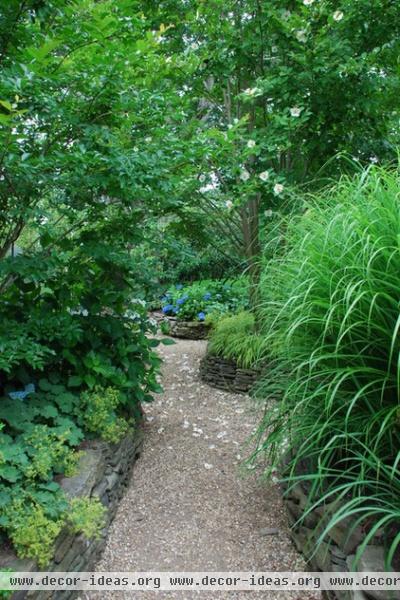
Lay out provocative paths. After the stage is set, the story begins to unfold; the journey begins in the form of the garden path. The traveler places emphasis on this part of the garden as he or she finds delight in the journey. These paths will seldom be straight. Sometimes the most memorable trips involve layovers rather than direct flights.
Serpentine paths allow a sense of mystery and discovery to be introduced into a garden. Strategically placed grasses, shrubs and small trees mask a clear view of the next leg of the journey. What’s around the bend?
Notice how the garden shown here is filled with interesting shapes and textures, provided by both the plant palette and the stone. The gravel underfoot creates another layer of depth by adding to the sense of exploration.

Repetition is of utmost importance when the traveler designs garden paths. Notice how the use of chartreuse and burgundy foliage alternating from side to side along this path creates rhythm and pulls the eye onward toward the destination. The stone sculpture is not the destination point of this garden but is a focal point from this view, creating a beautiful vignette.
It is also important to note that the spacing between rhythmic elements can increase or decrease the speed at which the visitor moves through the space. Elements spaced closer together will slow down the visitor; spaced farther apart they encourage a longer stride and a brisker walk. With this knowledge you can slow your visitors down to notice certain details that might otherwise go unnoticed.
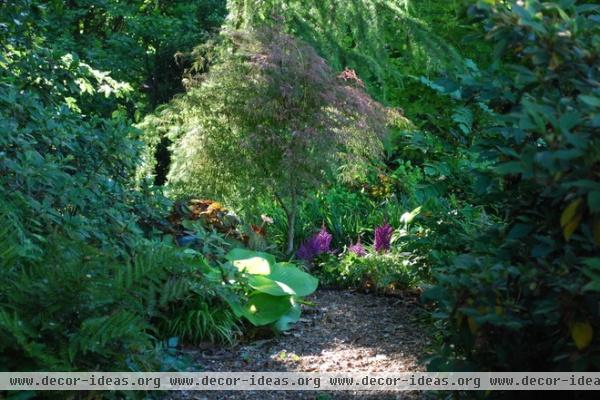
Create side journeys. Even a small garden, when thoughtfully designed, can incorporate secret garden rooms. Don’t overlook this important element. These small vignettes will provide additional layers of intrigue, discovery and delight. These secret garden rooms do not have to be large. Often a space large enough for only one or two people is most effective in evoking the desired response.
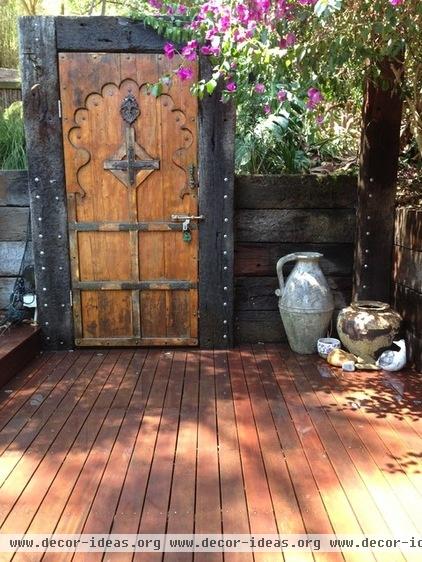
Incorporate art and artifacts to tell your story. Perhaps you have returned from a trip abroad with souvenirs or artifacts. Placed appropriately, these pieces will help you tell your story. A few pieces here and there will be sufficient. Remember, you are subtly telling your story, not creating a flea market.
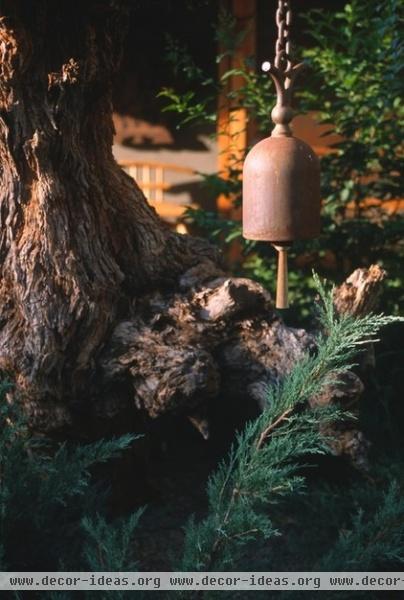
Embellish the journey with aromas and sounds. Memories of almost-forgotten experiences are rekindled through aromas and sounds. The bell shown in this photograph not only picks up the weathered color of the nearby tree trunk, but its sound may remind the visitor of a trip to Asia made long ago. Likewise, the fragrance of rosemary or gardenias may trigger pleasant memories in the mind of the garden visitor. The foliage of the honeybush (Melianthus major, zones 7 to 11) smells like peanut butter when crushed between your fingers. Most of us have fond childhood memories that include peanut butter sandwiches.
Don’t forget to provide this additional layer of experience; your garden visitor will thank you.
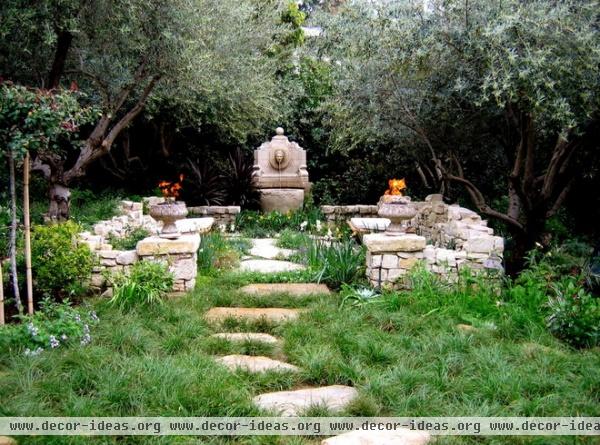
Create a worthy destination. Every journey has a destination, and so should every garden. Design this area to make an impact, to make your story unforgettable. Disappointment is not an appropriate emotion for your garden to evoke.
This photograph shows a worthy destination, one that tells a story. The designer of this space describes it as a Mediterranean fantasy, a garden room “resembling an ancient ruin where lovers met in secret,” in her words. She used crumbling stone walls, an Italian mosaic tile floor, olive trees, gaslit stone urns and a fountain fashioned from an antique laundry trough to tell the story of the traveler.
More: What Kind of Gardener Are You? Find Your Archetype
Related Articles Recommended












